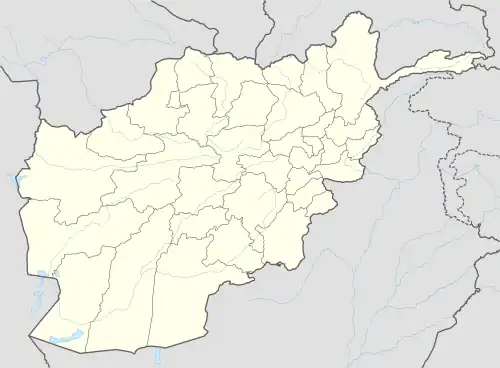| Kabul synagogue | |
|---|---|
| Religion | |
| Affiliation | Judaism |
| Status | Abandoned |
| Location | |
| Location | |
 Shown within Afghanistan | |
| Geographic coordinates | 34°31′53″N 69°10′22″E / 34.5315°N 69.1729°E |
| Architecture | |
| Completed | 1966 |
The Kabul synagogue, known by locals as the "Jewish Mosque",[1][2] is an abandoned Jewish synagogue in Kabul, Afghanistan. It was built in the 1960s, when Afghanistan's Jewish population numbered in the thousands. The synagogue fell into disrepair over the latter half of the 20th century due to the emigration of the country's Jewish population, damage during the Second Afghan Civil War, and persecution under the Taliban.
In the early years of the 21st century, the synagogue was home to Zablon Simintov and Yitzhak Levin, believed to be the last two Jews in Afghanistan, who served as the synagogue's caretakers. Levin died at the synagogue in 2005, and Simintov was evacuated from Afghanistan in 2021 after the Taliban takeover of the country.
Description and early history
In 1948, Afghanistan's Jewish population numbered approximately 5,000 people. In the early 1960s, the community built a synagogue around a small courtyard on Flower Street in downtown Kabul.[3] The two-story building has two sanctuaries and was dedicated on March 29, 1966.[2] The synagogue's door was made of corrugated iron and laden with Stars of David.[1] There is also a Jewish cemetery on the outskirts of the city where 1,000 people are reportedly buried.[2][4]
By the 1960s, much of the Jewish population had emigrated for better economic opportunities in the United States and Israel. At the time, Afghanistan was the only country in the Muslim world that allowed Jews to emigrate and retain their citizenship.[4]
Late 20th century
The country's last rabbi fled in 1988, and the last formal prayer services were held at the synagogue in 1990.[2] In the mid-1990s, Zablon Simintov moved into the synagogue, by then Kabul's only functioning synagogue, after his home was damaged during the Second Afghan Civil War. The Taliban had come to power in 1996, and the synagogue had been deserted and left in disrepair. The civil war left much of Kabul in ruins, and essentially all of the country's Jews had left Afghanistan. After a brief stint in Turkmenistan, Simintov returned to Kabul in 1998 or 1999[2] and was the synagogue's live-in caretaker. He also operated a carpet business out of the synagogue.[3]
The Taliban considered the synagogue un-Islamic and as such, ransacked the synagogue. The regime frequently arrested Simintov and fellow resident Yitzhak Levin as part of the Islamist government's effort to remove vestiges of non-Islamic influences from Afghanistan. In 1998, the Taliban confiscated almost all of the synagogue's items of value, such as a silver yad for reading the Torah and four silver bells. An unidentified Taliban commander, who was reportedly later held at Guantánamo Bay detention camp, confiscated the synagogue's Torah scroll estimated to be 400 years old.[3][5]
Simintov and Levin argued frequently about who was the rightful owner of the synagogue, and they lived in different wings of the synagogue. Each would complain to the Taliban about the other, to the point that the Taliban imprisoned both men.[5]
21st century
To disguise the synagogue from the outside, Simintov operated a kebab restaurant from the building called Balkh Bastan (Ancient Balkh) beginning in 2009.[4][6] Levin lived downstairs until his death in 2005,[1] when Simintov became the last Jew believed to be in Afghanistan and the synagogue's only live-in caretaker.[3] Every Shabbat, Simintov would read the Torah from the synagogue's bimah.[5] Simintov left Afghanistan in 2021.[7]
See also
- Yu Aw Synagogue, abandoned synagogue in Herat, Afghanistan
- History of the Jews in Afghanistan
References
- 1 2 3 Garfinkel, Jonathan (2013-05-29). "A Congregation of One". Tablet Magazine. Archived from the original on 2023-07-19. Retrieved 1 August 2023.
- 1 2 3 4 5 Judah, Tim (2002-01-04). "A very private war". The Guardian. Archived from the original on 2023-08-01. Retrieved 1 August 2023.
- 1 2 3 4 Aizenman, N.C. (2005-01-27). "Afghan Jew Becomes Country's One and Only". Washington Post. Archived from the original on 2023-08-09. Retrieved 21 July 2023.
- 1 2 3 Mehrdad, Ezzatullah (2018-11-28). "Afghanistan's last Jew fights to keep his home — the country's sole synagogue". Times of Israel. Archived from the original on 2023-08-01. Retrieved 1 August 2023.
- 1 2 3 Adkins, Laura (2019-10-31). "The last Jews in Afghanistan argued so much the Taliban kicked them out of prison and stole their Torah". Jewish Telegraphic Agency. Archived from the original on 2019-11-01. Retrieved 1 August 2023.
- ↑ Donati, Jessica (2013-11-12). "Last Jew in Afghanistan faces ruin as kebabs fail to sell". Reuters. Archived from the original on 2023-08-01. Retrieved 1 August 2023.
- ↑ Siddique, Abubakar (2021-09-10). "Last Afghan Jew Leaves Amid Minority Exodus In Fear Of Taliban". Radio Free Europe. Archived from the original on 2023-08-01. Retrieved 2023-08-01.